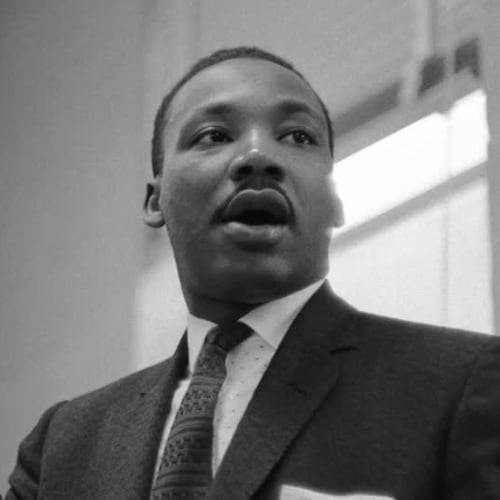Edwin Moses is a two-time Olympic gold medalist and the winner of 122 consecutive races while setting two world record times in the 400-meter hurdles.
His exploits on the track, as well as his contributions in engineering, investment management consulting and the Olympic Games Committee, have taken him to more than 120 countries.
And he is a “Morehouse Man.”
From a mural celebrating his athletic excellence to the Edwin Moses Track at the school’s B.T. Harvey Stadium, the presence of the 1978 graduate looms large on campus.
On a crisp January afternoon, I walked through Morehouse with Moses, listening as he told me stories and remembered professors. He pointed to his old dorm and lamented the loss of an old neighborhood steakhouse, that ironically once sat in the middle of the land that is now the stadium that bears his name. The era of Morehouse that Moses experienced is similar to mine in many ways but vastly different in others.
The first time I met Moses was inside that stadium in August 2022 when Morehouse dedicated our new refurbished track in his honor. As a sophomore still looking for my footing on the campus, Moses’ story drove me to realize how much is possible through standing on the values of our alums.
He began his journey through Morehouse in 1973. I began mine in 2020. Our exposure to the college is about 50 years apart, but we are connected.
Credit: Getty Images
Credit: Getty Images
In the 1970s, Morehouse had no track on campus, so the budding Olympian had to travel across the city to places like Lakewood High School and Booker T. Washington High School to find tracks to practice on.
Around this time many of the dormitories and buildings that I know now, didn’t exist. Academic and extracurricular programming were limited.
“We were basically on our own,” he said.
However, what has stayed consistent at Morehouse is the leverage of the brotherhood in those moments of adversity. Since his time as an athlete, Moses has stayed engaged with the Morehouse Athletics Department and is a consistent servant leader in the Atlanta area.
“We had a whole different attitude on the world and where we were supposed to be. We were that first generation that was pushed out and told you don’t have to be afraid,” he told me.
Moses said attending Morehouse and coming of age during the Vietnam War and the assassinations of Malcolm X, Robert Kennedy, the Rev. Martin Luther King Jr. and John F. Kennedy forced his generation to shift their mentality and create a stronger sense of unity and stability.
His schoolmates included Academy Award-winning director Spike Lee; Martin Luther King III; Jeh Johnson, the Homeland Security secretary under Barack Obama; and John S. Wilson, who after being elected senior class president told his classmates that he would one day be the president of Morehouse, which he was from 2012 to 2017.
“We weren’t really coddled. All of us were ready to battle,” he said. “If you meet guys from my generation now, there’s just something different about us because we saw a lot and we had to step into what was going on in the world.”
My generation has now dealt with the murder of George Floyd, the dichotomy of the Atlanta Public Safety Training Center, the COVID-19 pandemic and now the Israel-Hamas War.
The tenacity and collaborative work of those in Moses’ era has inspired many generations thereafter of Morehouse to use our gifts to be active in local, national and international affairs.
Last semester, students and administration worked together on a panel series to further educate and initiate conversations on the Israel-Hamas conflict including a protest at the CNN center led by a Spelman College student in October.
Morehouse students also led protests and panel discussions fighting the construction of the Atlanta Public Safety Training Center. Last February, while people protested outside of the Ray Charles Performing Arts Center, we were inside holding a town hall meeting with Atlanta Mayor Andre Dickens about our fears that an increase of law enforcement will put more people who look like us in danger of police brutality.
Walking past the Morehouse College Martin Luther King Jr. International Chapel and the shadow of King’s giant statue that rises in front of it, Moses and I talked about contributions to the campus since his graduation.
In the early 1990s, Moses, as a member of the International Olympic Committee — and sensing that Morehouse was being left out of the city’s infrastructure plan — was one of the driving forces behind the construction of Forbes Arena which was built for the 1996 Olympic Games.
“I facilitated them to get into the mix, and that’s why we have the new gym over there,” he said pointing toward Forbes. “Because we didn’t get bypassed.”
He was also pivotal in the construction of the track named in his honor.
“It wasn’t about my name being on the track,” Moses said. “It was about the fact that we needed to have that facility for the guys.”
The “guys” have used that track to win a record 22 consecutive Southern Intercollegiate Athletic Conference track and field championships.
Moses smiled when I reminded him of that number. He told me that he wants to see Morehouse continue to grow through a vision rooted in stability and intention.
“There’s a lot of people on this planet that are looking for people, for Morehouse Men, who are highly qualified and ready to work,” he said.
The weather got chilly by the time we got back to the Morehouse gate across from the stadium. I shook his hand and he drew me in for a brotherly hug — Morehouse Man to Man of Morehouse.
I had to go to class.
Moses had to go to work.
About the Author
The Latest
Featured

